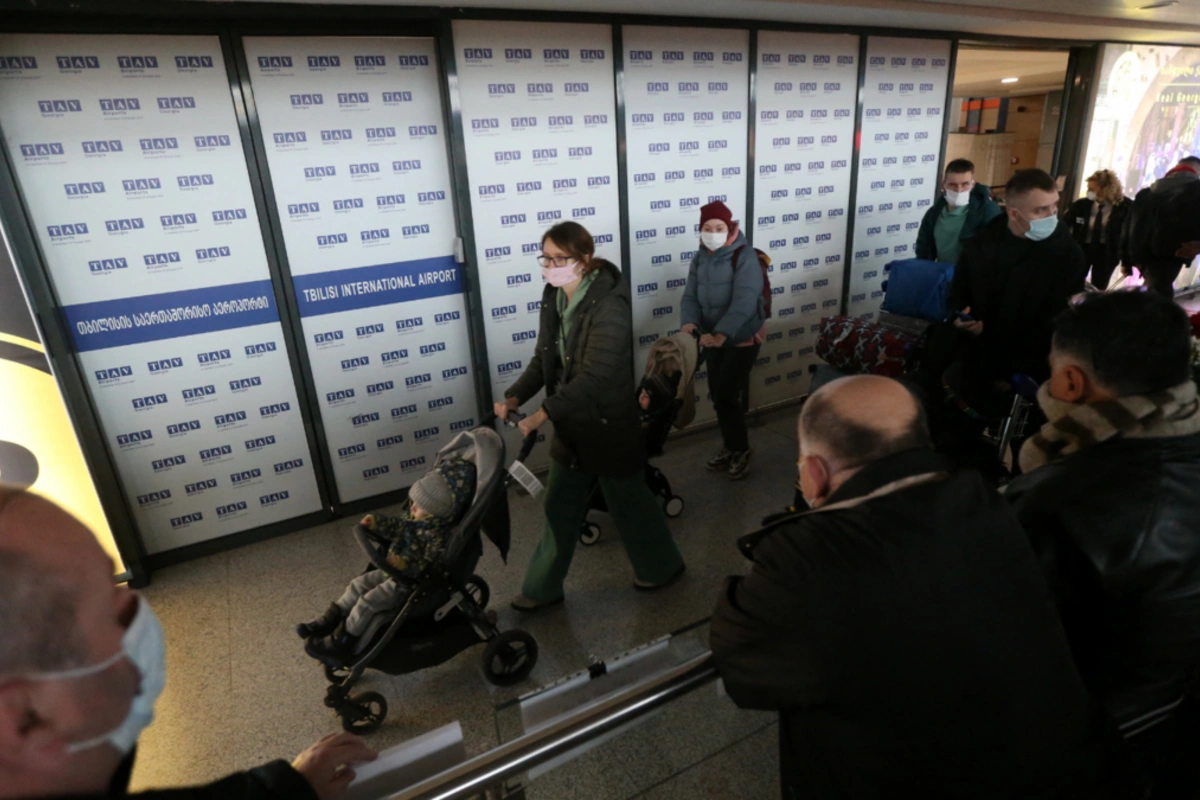
Faced with a growing flood of Russians fleeing their sanction hit country, Georgia sees both opportunity and peril: the real estate market has started to boom, but locals fear the influence of newcomers on their society.
Passengers, including Russian and Belarusian citizens, walk in an airport terminal upon their arrival in Tbilisi, Georgia, March 9, 2022. REUTERS/Irakli Gedenidze
The Russian war against Ukraine has changed international order as we know it. The West has imposed various sanctions, but for ordinary Russians, the most difficult appear to be financial limitations. These have depreciated the national currency to a new historical low. As a result, an influx of Russian citizens to neighbouring countries ensued, and Georgia, despite a pervasive anti-Russian attitude in society, is no exception. According to Levan Davitashvili, the Minister of Economy and Sustainable Development of Georgia, up to 20 - 25000 Russians entered the territory of Georgia during recent days, and the flow of Russians has not yet stopped.
This migration wave is concerning for the citizens of Georgia: after all Russia invaded Ukraine claiming to protect “Russian-language Ukrainians” who they insist have experienced discrimination by Ukrainian nationalists. Citizens of Georgia have heard rhetoric similar to this before when their own land was invaded by Russia in 2008, resulting in the occupation of Georgian territories - Abkhazia and South Ossetia. Georgians are nervous about Russian mass immigration and are demanding to abolish the current visa-free agreement with Russia. They fear that agents and saboteurs might follow peaceful citizens who are running away from the Russian government.
To voice their demand, Georgians have created a petition. The response of the ruling Georgian Dream (GD) party was straightforward, that discrimination against Russians due to their nationality was “completely and categorically unacceptable.” GD’s chairman, Irakli Kobakhidze, further suggested that the opposition United National Movement (UNM) was in danger of embroiling Georgia in the war. He pointed out that a previous UNM government was responsible for introducing the Visa-Free regime with Russia, and that his government will not be changing it.
Later, on March 8, the State Security Service of Georgia (SSSG) published a statement, that emphasized it was actively carrying out all necessary measures to minimize possible risks and challenges of the influx. It stated that all individuals staying in the country who might represent any potential risk would be monitored.
Russians are self-organizing and sharing information about entry to Georgia - primarily by using Telegram groups created solely for this purpose. Since 2019 Russia terminated direct flights to Georgia due to the “Gavrilov Crisis.” Hence, transitioning to life in Georgia is not so simple for Russians. Some recent immigrants appear to be trying to cut some corners with illegal activities. A query on one of the groups reads: “Where can I buy a driving license in Georgia?” A screenshot of the comment went viral and was met with outrage on social media. Georgia has worked very hard to eliminate bribery and corruption in government services and structures so the thought that Russian citizens might help re-introduce them sparks anger. Whether Russians plan to stay in Georgia forever or for a short amount of time, things like buying a driving license and bribing police officers are not welcome here in Georgia. Those who plan to enjoy Georgian hospitality are expected to respect Georgian rules and traditions.
Still, the position of Georgians cannot be painted with a single brush. A small proportion of the public say that nothing should change, and that we have to accept any Russian citizen fleeing from Putin’s regime. Others say we should accept Russians but with a strict background check. Others favour introducing visa regulations and others that we should not greet them with our well-known Georgian hospitality.
The reactions of businesses are not consistent either. Some are organizing anti-Russian campaigns like refusing to sell or rent property to Russians. Others are happy that demand in the real estate market is increasing. Levan Kiladze, the Co-Founder of SS.GE (a real estate platform), reported to Publika.ge that interest in Georgian real estate from Russians had exploded since the global introduction of anti-Russian sanctions, rising from approximately 800-900 queries per day before to 5000-6000 after. Kiladze added that Russians are more interested in buying real estate than renting.
The Russian government recently passed a censorship law which prohibits the media in Russia from using the word “war” about the conflict in Ukraine. Many opposition media outlets closed down, and many journalists have left the country, some coming to Georgia. One of these was Renat Davletgildeev who talked to RTVi in Tbilisi after his arrival on March 8. He explained that he had fled to Georgia seeking freedom of speech, as had many of his fellow Russian journalist friends. Together they don’t rule out establishing a Russian-language media platform in Tbilisi.
However, he accepted that there were problems. For example, since sanctions began, Russian debit and credit cards don’t work in Georgia, and they cannot even be linked to simple services like online taxi payments. Therefore, many Russians have been going on trips to Armenia, a country that has not imposed no sanctions on Russia, to withdraw money there. More importantly he accepts that Georgian society is uneasy with large numbers of Russians arriving in the country and he advises his compatriots arriving in the country to avoid provocations.
Share on social media